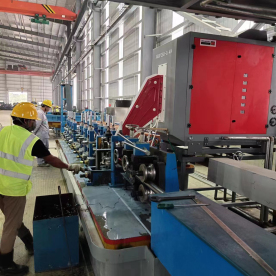[Annealing Machine Applications in Industry]Taking a Closer Look at Annealing Machine Applications in Industry

Taking a Closer Look at Annealing Machine Applications in Industry
When it comes to metalworking and industrial processes, annealing machines play a crucial role in ensuring the quality and durability of a wide range of products. From automotive parts to aerospace components, annealing machines are utilized in various industries for their unique ability to enhance the material properties of metals. In this article, we will delve into the different applications of annealing machines in industry and explore how they contribute to the manufacturing process.

Taking a Closer Look at Annealing Machine Applications in Industry
Annealing machines are thermal treatment equipment that heat metals to specific temperatures and hold them at those temperatures for a predetermined time period before cooling them down. This process helps to relieve internal stresses in metals, improve ductility, and enhance their mechanical properties. By altering the microstructure of metals, annealing machines can increase hardness, toughness, and machinability, making them suitable for a wide range of applications.
One of the key applications of annealing machines in industry is in the production of automotive components. From engine parts to chassis components, annealing machines are used to improve the mechanical properties of metals, ensuring that they meet the stringent requirements of the automotive industry. By annealing metals, manufacturers can achieve the desired hardness and strength levels while maintaining excellent formability and weldability.
In the aerospace industry, annealing machines are essential for the production of aircraft components that require high strength and durability. By subjecting metals to controlled heat treatment processes, manufacturers can tailor the material properties of aerospace components to meet the demanding performance standards of the industry. Annealing machines play a critical role in enhancing the fatigue resistance and corrosion resistance of aircraft components, ensuring the safety and reliability of the aircraft.
The electronics industry also relies on annealing machines for the production of semiconductors and electronic components. By annealing metals at specific temperatures, manufacturers can manipulate the electrical properties of materials, making them suitable for use in electronic devices. Annealing machines are used to enhance the conductivity and resistivity of metals, improving the performance of electronic components and ensuring their reliability in high-tech applications.

Taking a Closer Look at Annealing Machine Applications in Industry
In the medical device industry, annealing machines are utilized to improve the biocompatibility and mechanical properties of medical implants and instruments. By subjecting metals to controlled heat treatment processes, manufacturers can enhance the corrosion resistance and fatigue resistance of medical devices, ensuring their long-term performance and biocompatibility in the human body. Annealing machines play a crucial role in ensuring the quality and reliability of medical devices, helping to improve patient outcomes and safety.
Overall, annealing machines have a wide range of applications in various industries, from automotive and aerospace to electronics and medical devices. By enhancing the material properties of metals, annealing machines play a crucial role in improving the quality and durability of products, ensuring their performance and reliability in demanding applications. As technology continues to advance, the demand for annealing machines is expected to grow, driving innovation and efficiency in industrial processes.Solid state HF welder with wire feed system
